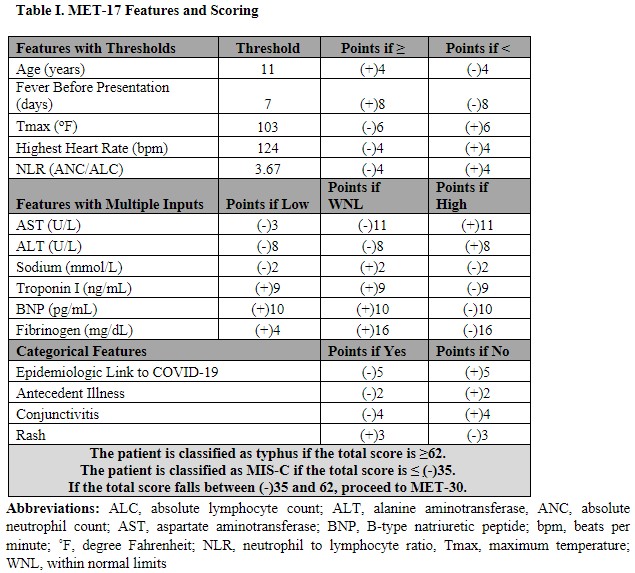Session Information
Date: Tuesday, November 14, 2023
Title: (2039–2060) Pediatric Rheumatology – Clinical Poster III: Potpourri
Session Type: Poster Session C
Session Time: 9:00AM-11:00AM
Background/Purpose: Multisystem inflammatory syndrome in children (MIS-C) following SARS-CoV2infection is a recognized mimic of other inflammatory disorders, including Kawasaki Disease and macrophage activation syndrome. However, MIS-C can also mimic acute infections, such as endemic typhus, presenting a diagnostic challenge with discordant treatments. We aimed to use artificial intelligence (AI) to develop a clinical decision support system that rapidly and accurately distinguishes MIS-C versus Endemic Typhus (MET).
Methods: With local IRB approval, 49 demographic, clinical, and laboratory features (21 categorical and 28 continuous) available within 6 hours of presentation were retrospectively extracted from the electronic medical records of 133 MIS-C and 87 typhus patients admitted to a single quaternary pediatric system between January 1, 2020 and December 31, 2021. Laboratory values were considered high, low or normal based on institutional norms. Using the attention module of a deep learning model and prioritizing accuracy, during training and testing we iteratively narrowed down to the 30 features necessary to maintain complete accuracy in classification. The AI-MET clinical decision support system was built to use these 30 clinical features, combined with the importance assigned to them by the attention module, to assist providers in distinguishing between MIS-C and typhus manually (i.e., without software) as often as possible.
Results: AI-MET is a two-phase clinical decision support system. In phase 1 of AI-MET, a provider uses 17 features to manually calculate a score (MET-17) to arrive at a diagnostic classification (Table I). If the MET-17 score does not surpass a pre-determined confidence level, 13 additional features are added and the MET-30 score is calculated using a recurrent neural network. While 24 of the 30 features (80%) were statistically different between patients with MIS-C and typhus, values for each feature alone were so overlapping between the two patient groups that the features were irrelevant distinguishers as individual parameters. However, AI-MET successfully classified all 220 typhus and MIS-C patients with 100% accuracy. Approximately half of the patients were classified manually with sufficient confidence during phase I using MET-17 that MET-30 (i.e., software) was not needed. A validation cohort of 111 additional MIS-C patients with all 30 AI-MET features available was also classified as MIS-C with 99% accuracy (110/111).
Conclusion: There is significant diagnostic overlap between MIS-C and endemic typhus. Artificial intelligence can successfully distinguish these diagnoses using features typically available within the first 6 hours of patient presentation. As a clinical decision support system, AI-MET will be a valuable tool for front-line providers facing the difficulty of timely diagnosis of a febrile child in endemic areas.
To cite this abstract in AMA style:
Chun A, Bautista-Castillo A, Osuna I, Nasto K, Munoz F, Schutze G, Devaraj S, Muscal E, De Guzman M, Sexson Tejtel K, Kakadiaris I, Vogel T. Distinguishing Multisystem Inflammatory Syndrome in Children from Typhus Using Artificial Intelligence: MISC vs. Endemic Typhus (AI-MET) [abstract]. Arthritis Rheumatol. 2023; 75 (suppl 9). https://acrabstracts.org/abstract/distinguishing-multisystem-inflammatory-syndrome-in-children-from-typhus-using-artificial-intelligence-misc-vs-endemic-typhus-ai-met/. Accessed .« Back to ACR Convergence 2023
ACR Meeting Abstracts - https://acrabstracts.org/abstract/distinguishing-multisystem-inflammatory-syndrome-in-children-from-typhus-using-artificial-intelligence-misc-vs-endemic-typhus-ai-met/

